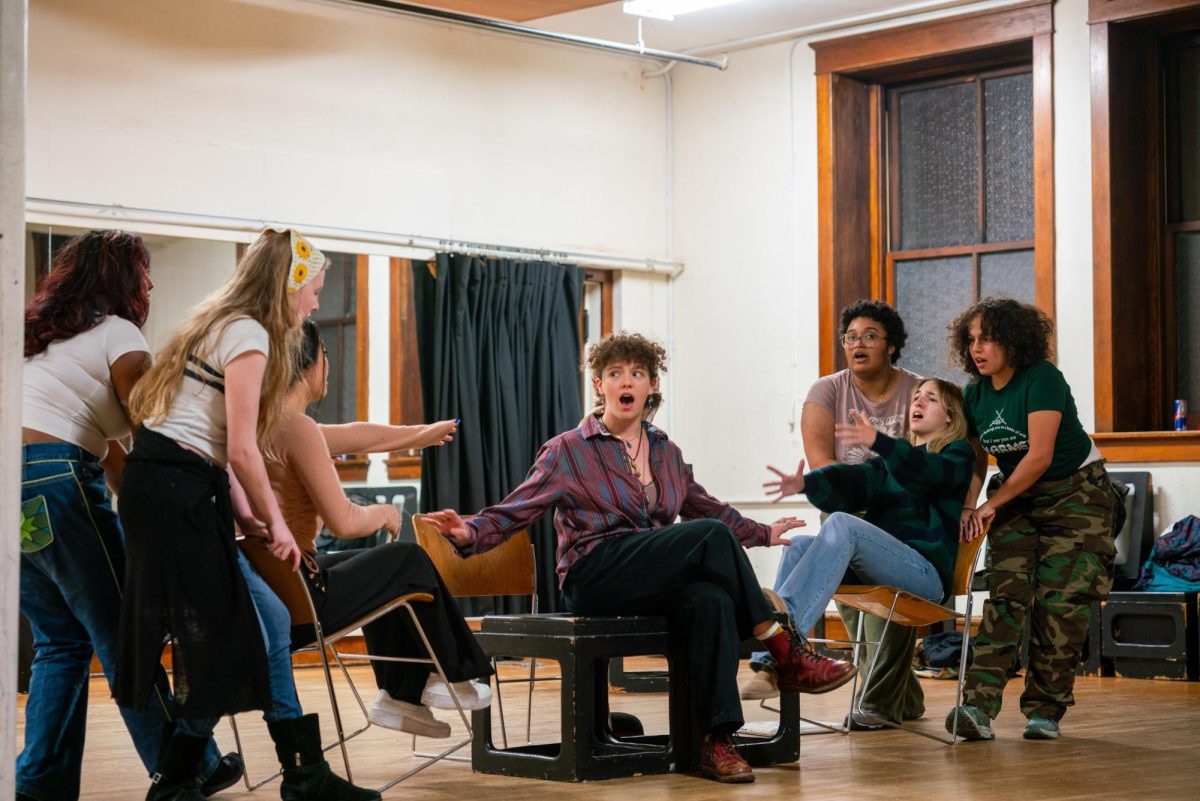Eurydice Tells Orpheus Goodbye, an original one-act musical written, composed, and directed by double-degree second-year Calvin Ray Shawler, is a melancholic yet uniting story of strength transcending time. It plays in Dye Lecture Hall Nov. 23–24.
The musical is divided into three main parts, with a fourth part serving as an epilogue. The actors speak the first part aloud; “Part One: Near Past” is an introduction that jolts the audience into rapt attention. We start with Mama (College first-year Sarai Brown Ratner) and her daughter Hope (College second-year Leila Ismail) as they get ready to go outside. We quickly realize that something is missing: a sister is gone. This realization of grief and death informs the exploratory nature of the show. Hope puts on a scarf, which has been passed down through generations, and something shifts. More people come into the house, namely Mrs. Sweet (College second-year Uma Menon), Grace (Conservatory second-year Ashlyn Tsui), and Chastity (College fourth-year Chloe Sinder). People are talking, Hope is scared, and we, the audience, are a little confused. Modesty (College second-year Ela Carola Shapiro-Alster) breaks a window to get into the house. It becomes clear that there is some sort of communicative barrier; some characters can see and hear each other, and some cannot. This is the moment we realize the ambiguity and fluidity of time. The house, occupied by so many people at different times and in all sorts of places, is a space for healing, discovery, and awakenings — both good and bad.
The second part introduces the story of Eurydice and Orpheus with a twist — Orpheus (College first-year Kendal Walls) comes off as sinister instead of charming. However, just like in the myth, he sways everyone with his singing. Shawler imbues Orpheus’ character with a dark charisma; his presence leads the ensemble to shift their singing around his solos — the closest this show gets to a “traditional” musical style. Walls expertly displays an alluring and foreboding demeanor in the role of Orpheus, creating an excellent foil for Eurydice, played by Tsui.
What’s particularly interesting is how Eurydice navigates her fate. She finds strength in the rain, struggle, endurance, and the coming of spring. Tsui holds this quiet strength in her powerful yet touching performance. More mythological characters featured in the musical are Persephone and Hades, both played by Shapiro-Alster. Shapiro-Alster conveys both characters in entirely different ways: Hades is firm and direct, and Persephone is hardened yet has a gentle heart. Persephone helps Eurydice embark on the road to self-discovery, reconnecting her with the house’s community.
The singing and movement throughout the musical reflect communal strength. At the tail end of the rehearsal process, Shawler played the piano while the actors sang, creating astonishingly resonant, complex, and dissonant chords. Every movement by the actors was intentional, and the ensemble numbers truly speak to the audience — they were so immersive and grounded in truth that I almost forgot I was watching a play. Most numbers in the musical have a rhythmic element. Whether it be speaking, clapping, or stomping, the tempo breaks up the story, emphasizing each individual piece’s impact. Behind the scenes, the stage manager, College second-year Juno Rose Thompson, claps along with the actors. The hard work and devotion that each person involved in the show has poured into it is clear; every actor has an important role to play.
Fans of Eurydice by Sarah Ruhl will love this musical. While Ruhl’s version flips the story of Orpheus and Eurydice to focus on Eurydice’s point of view, Shawler’s musical takes it a step further. Eurydice is just one part of the story, and we get to know many characters who go through a common struggle: the strife that women of color experience under an oppressive society ruled by white men like Orpheus. In “Part Three: Distant Past,” Son, also played by Walls, discusses his crimes on the world and women that he committed all for his own gain, saying, “I never look back. I could lose everything.” Shawler’s clever writing effectively twists the myth created by patriarchal systems in the first place: Orpheus, the white savior, is the villain.
The concept of motherhood appears several times throughout the musical, starting with Mama; continuing with Persephone mentioning her love for her mother, Demeter; and ending with the motherhood of time and its comforting nature that demonstrates we aren’t alone. Generally, there is a sense of community rising out of struggle. Even the wording of the title is powerful. Eurydice distances herself from Orpheus, implicitly telling him goodbye instead of saying it out loud. When she tells him to go, she is strengthened by the community in her house of the underworld.
Eurydice Tells Orpheus Goodbye is a tale of strife, reconnection, and hope for the future. The multiplicities crafted by the director and actors make this musical well worth a watch, showing how a mythological and metaphysical tale can be more real than we think and expose privilege and biases inherent in today’s power structures. Like the show’s motto, “tomorrow forever,” the musical prompts us to acknowledge the dual state of stagnation and hope we experience, looking toward the future and remembering the past.














